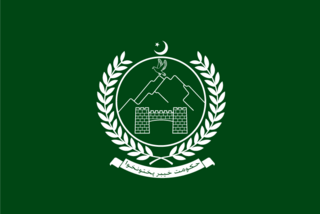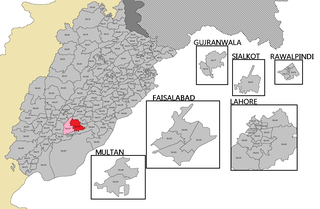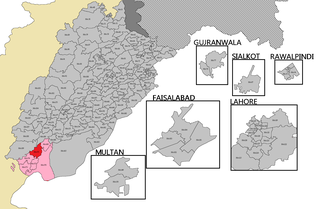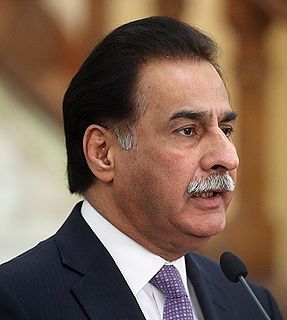Related Research Articles

The prime minister of Pakistan is the constitutional head of government of the Islamic Republic of Pakistan, designated as the "Chief Executive of the Islamic Republic".

The National Assembly or Aiwān-e-Zairīñ of Pākistān is the lower legislative house of the bicameral Parliament of Pakistan, which also comprises the Senate of Pakistan. The National Assembly and the Senate both convene at Parliament House in Islamabad. The National Assembly is a democratically elected body consisting of a total of 342 members who are referred to as Members of the National Assembly (MNAs), of which 272 are directly elected members and 70 reserved seats for women and religious minorities. A political party must secure 172 seats to obtain and preserve a majority.

The Parliament of Pakistan is the federal and supreme legislative body of Pakistan. It is a bicameral federal legislature that consists of the Senate as the upper house and the National Assembly as the lower house. According to the constitution of the Islamic Republic of Pakistan, the President of Pakistan is also a component of the Parliament. The National Assembly is elected for a five-year term on the basis of adult franchise and one-man one-vote. The tenure of a Member of the National Assembly is for the duration of the house, or sooner, in case the Member dies or resigns. The tenure of the National Assembly also comes to an end if dissolved on the advice of the Prime Minister or by the president in his discretion under the Constitution.

The Pakistan Tehreek-e-Insaf is a political party in Pakistan. It was founded in 1996 by Pakistani cricketer-turned-politician Imran Khan, who served as the country's prime minister from 2018 to 2022. The PTI is one of the three major Pakistani political parties alongside the Pakistan Muslim League–Nawaz (PML–N) and the Pakistan People's Party (PPP), and it is the largest party in terms of representation in the National Assembly of Pakistan since the 2018 general election. With over 10 million members in Pakistan and abroad, it claims to be the country's largest political party by primary membership as well as one of the largest political parties in the world.

Asfandyar Wali Khan is a Pakistani Pashtun politician who is the president of the Awami National Party (ANP). His father, Abdul Wali Khan, was the party's first president. He is the grandson of Abdul Ghaffar Khan, better known as Bacha Khan; Abdul Ghaffar was the founder of the non-violent political movement in NWFP, Khudai Khidmatgar during British colonial rule in India and a companion of Mahatma Gandhi. Asfandyar's Granduncle Khan Abdul Jabbar Khan was the Indian National Congress's Chief Minister of the North West Frontier Province, during the waning days of the British Raj, and also the Chief Minister of the province during the early days of independent Pakistan. Asfandyar is the present president of the Awami National Party and has served as Member of Provincial Assembly of Khyber Pakhtunkhwa, Member of the National Assembly of Pakistan and senator in the Senate of Pakistan. Asfandyar Wali Khan got credit of provincial autonomy in Pakistan and the renaming of North West Frontier Province as Khyber Pukhtoonkhwa with support of coalition partner PPP during 18th amendment 2010.

Jhang is the capital city of Jhang District, in the central portion of the province of Punjab, Pakistan. Situated on the east bank of the Chenab river, it is the 18th largest city of Pakistan by population.

The Provincial Assembly ofKhyber Pakhtunkhwa is a unicameral legislature of elected representatives of the Pakistani province of Khyber Pakhtunkhwa, which is located in Peshawar, the provincial capital. It was established under Article 106 of the Constitution of Pakistan previously having a total of 124 seats, with 99 general seats, 22 seats reserved for women and 3 seats for non-Muslims. After the merger of FATA with the Province of Khyber Pakhtunkhwa, the total seats rose from 124 to 145 by adding 16 general seats, 4 seats reserved for women and 1 reserved for a non-Muslim.

Chaudhary Nisar Ali Khan is a Pakistani politician who served as the Interior Minister from 2013 to 2017. He is currently an independent member-of the Provincial Assembly of Punjab - elected to represent PP-10 since 26 May 2021 having won in the General Election 2018. He however was unsuccessful in winning a National Assembly seat A former leader of the Pakistan Muslim League (Nawaz), Khan had been a member of the National Assembly of Pakistan between 1985 and May 2018. He was the Leader of the Opposition in the National Assembly from 2008 to 2013.

Arif-ur-Rehman Alvi is a Pakistani politician serving as the 13th and current president of Pakistan, in office since 9 September 2018. He was a member of the National Assembly of Pakistan from June 2013 to May 2018 and again from August to September 2018. A founding member of Pakistan Tehreek-i-Insaf (PTI), Alvi was elected as President of Pakistan on 4 September 2018 following the presidential election.

NA-98 (Faisalabad-IV) is a constituency for the National Assembly of Pakistan comprising mainly Sammundri Tehsil from the former NA-79 and the town of Mamu Kanjan in Tandlian Wala Tehsil from the former NA-78. The remaining part of Tandlian Wala Tehsil, which was previously in NA-78, is now in NA-103.

NA-76 (Gujranwala-IV) is a constituency for the National Assembly of Pakistan.

NA-154 (Lodhran-I) is a constituency for the National Assembly of Pakistan.

NA-159 (Vehari-IV) is a constituency for the National Assembly of Pakistan.

NA-171 is a constituency for the National Assembly of Pakistan.

Sardar Ayaz Sadiq is a Pakistani politician who has been a member of the National Assembly of Pakistan since August 2002.He served as the 19th Speaker of the National Assembly of Pakistan from June 2013 to August 2015 and again from November 2015 to August 2018.

Jam Mir Kamal Khan Alyani is a Pakistani politician who served as the 16th Chief Minister of Balochistan, between August 2018 and October 2021. He has been a member of the Provincial Assembly of Balochistan since August 2018.
Fazal Muhammad Khan is a Pakistani politician who had been a member of the National Assembly of Pakistan from August 2018 till July 2022.
A political and constitutional crisis emerged in Pakistan when, on 3 April 2022, National Assembly Deputy Speaker Qasim Khan Suri dismissed a no-confidence motion against Prime Minister Imran Khan during a session in which it was expected to be taken up for a vote, alleging that a foreign country's involvement in the regime change was contradictory to Article 5 of the Constitution of Pakistan. Moments later, Khan stated in a televised address that he had advised President Arif Alvi to dissolve the National Assembly. Alvi complied with Khan's advice under Article 58 of the constitution. This resulted in the Supreme Court of Pakistan (SCP) taking a suo moto notice of the ongoing situation, creating a constitutional crisis, as effectively, Imran Khan led a constitutional coup. Four days later, the SCP ruled that the dismissal of the no-confidence motion, the prorogation of the National Assembly, the advice from Imran Khan to President Arif Alvi to dissolve the National Assembly and the subsequent dissolution of the National Assembly were unconstitutional, and overturned these actions in a 5-0 vote. The Supreme Court further held that the National Assembly had not been prorogued and had to be reconvened by the speaker immediately and no later than 10:30 a.m. on 9 April 2022.
References
- ↑ "LIST OF MEMBERS OF THE 4TH NATIONAL ASSEMBLY OF PAKISTAN FROM 1965-1969" (PDF). na.gov.pk. Retrieved 19 January 2021.